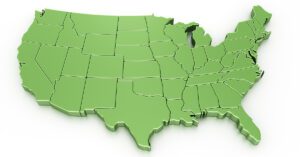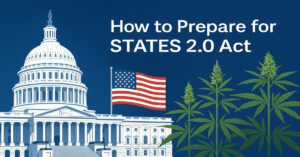The New York State Office of Cannabis Management (OCM) officially released its Marihuana Regulation and Taxation Act (MRTA) Implementation Report, marking three years of progress in building a comprehensive legal framework for the adult-use cannabis, medical cannabis, and cannabinoid hemp industries.
The report highlights the OCM’s commitment to fulfilling the goals of the MRTA, particularly in promoting equity and expanding opportunities for communities disproportionately impacted by cannabis prohibition. The OCM has worked diligently to grow the legal cannabis market, fostering economic opportunities, protecting public health and safety, enforcing cannabis laws and regulations, and protecting the environment. Additionally, the OCM has taken significant steps to crack down on the illicit market, a key priority in ensuring the success of the legal cannabis industry.
However, despite these accomplishments, the report also brings to light a major issue: a massive backlog in processing cannabis license applications.
As of September 2024, approximately 5,700 applications are still awaiting review, with the majority of these in the Adult-Use Retail, Distribution, and Microbusiness categories. This backlog has left thousands of would-be cannabis entrepreneurs in a state of uncertainty, with their business plans on hold as they wait for their applications to move through the system. The delay has created frustration and financial pressure on applicants, many of whom have invested significant time and resources into preparing for their businesses only to be met with prolonged waiting periods.
Challenges Slowing Down the Licensing Process
Several factors contribute to these delays. One of the primary challenges is the regulatory complexity of the MRTA. The extensive rules and requirements for cannabis businesses, from zoning and security to financial disclosures, are intricate and time-consuming for both applicants and the OCM to navigate. Legal disputes have also contributed to the slowdown, as lawsuits concerning the distribution of licenses and equity mandates have, at times, brought the process to a halt. These legal challenges have created bottlenecks in the system, further delaying the issuance of licenses.
Additionally, the OCM is facing significant resource constraints. The agency has been inundated with thousands of applications, and its limited staffing capacity has made it difficult to keep pace. The OCM is currently grappling with a staffing shortage that exacerbates the administrative backlog. This issue is compounded by the fact that many key administrative functions, such as issuing denials or responding to objections from local jurisdictions, require approval from the Cannabis Control Board (CCB), which only meets once a month. This limited meeting schedule means that even routine administrative actions can take weeks or months to resolve, slowing the overall pace of application processing.
Compliance issues also present a significant challenge. Many applicants have struggled to meet the strict requirements related to zoning, security, and financial disclosures, leading to repeated back-and-forth communications with regulators. This process of revising and resubmitting application materials has contributed to the delays. Additionally, securing local municipal support has proven to be a major hurdle for many applicants. Some municipalities have opted out of allowing cannabis sales entirely, while others impose complex zoning restrictions, making it difficult for applicants to find suitable locations for their businesses. These local challenges have further slowed the licensing process.
Meanwhile, the persistence of the black market continues to divert resources and attention away from the legal cannabis market. The OCM has ramped up enforcement efforts to crack down on illicit cannabis sales, but these efforts require significant time and resources, which further slows the processing of legal license applications. Balancing the need to enforce cannabis laws while promoting the growth of the legal market has proven to be a challenging task for the OCM.
Efforts to Expedite the Licensing Process
Priority Processing: In an effort to address these delays, the OCM has begun implementing measures to speed up the application process. One key change is a shift in priority for processing applications. The state has chosen to focus first on those cannabis retail applicants who applied with a secured retail location during the application window in November 2023. These applicants are facing the greatest financial risk, as they have been paying rent on their locations for nearly a year without being able to open their businesses. By prioritizing these applications, the state aims to alleviate some of the financial strain on these applicants and bring more legal retail dispensaries into operation.
Setback Distance Waivers: For provisional licensees who applied in December 2023, the path forward is less clear. These applicants will likely have to wait until 2025 before their applications are processed, and once their licenses are provisionally approved, they will still need to navigate the lengthy process of securing a compliant location. New York’s strict zoning laws, which require a minimum distance of 2,000 feet between dispensaries in municipalities with populations under 20,000 and 1,000 feet in municipalities with larger populations, make it difficult for applicants to find available properties. To address this issue, the Cannabis Control Board recently passed a resolution allowing applicants to apply for waivers from the setback distance requirements in certain circumstances, such as when granting the license would promote public convenience or when physical barriers like rivers or highways separate the two locations. This waiver process is intended to help provisional applicants find suitable locations and move forward with their businesses.
Mapping Tools: The OCM has also introduced tools to assist provisional applicants in planning for their transition to an annual license. The newly released “Proximity Protected Locations for Adult-Use Retail Dispensaries & Registered Organizations Map” helps applicants easily identify where existing and pending retail locations are situated, allowing them to make informed decisions about where to open their dispensaries.
Administrative Changes to Speed Up Processing: In addition to these practical tools, the OCM has made administrative changes to streamline the licensing process. The Cannabis Control Board recently passed a resolution delegating some of its authority to the OCM, allowing the office to issue denials for certain Adult-Use Cannabis licenses without waiting for a full Board meeting. By transferring these more routine administrative tasks to the OCM, the state hopes to expedite the application process and reduce the backlog of pending licenses.
These efforts demonstrate the OCM’s commitment to accelerating the licensing process and ensuring that New York’s cannabis industry can continue to grow in a regulated and equitable manner. While challenges remain, the state is taking steps to address the bottlenecks and support both provisional and fully licensed cannabis businesses in navigating the complex regulatory landscape.





